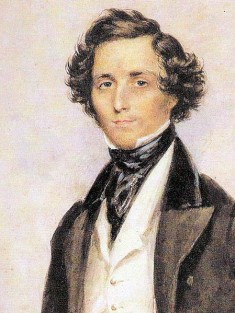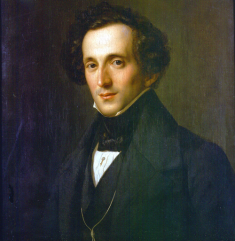| Felix Mendelssohn | |
|---|---|
 |
|
| Composer | |
| Specialty | Pianist, organist, conductor |
| Born | Feb. 3, 1809 |
| Died | Nov. 4, 1847 |
| Nationality | German |
Felix Mendelssohn was born on February 3, 1809, in Hamburg, Germany. He was a German composer of early Romantic times and his work includes concertos, symphonies, piano, oratories and chamber music.
Early Years
Felix was born into a family of intellectuals. As a result, he was immersed in the ideal cultural environment for his artistic values. As a teenager, he performed his works at home with a private orchestra for the intellectual and artistic elite of Berlin where his family had settled. At the age of 20, he conducted a Bach’s St. Matthew Passion in its first performance since the death of its original composer.
With this interest in Bach, Mendelssohn earned international reputation. He also performed as an organist, pianist, and conductor in England and German where his music was popular. He even visited and played for the Queen a few times.
Mendelssohn as a Composer
Felix Mendelssohn produced work of unusual mastery at an early age. He was influenced greatly in his childhood by the music of Mozart and Bach. However, his outstanding capacities were revealed clearly in his more mature works before he reached the age of 18 years old, including The String Octet, which he produced in 1825, and his Overture to Shakespeare’s A Midsummer Night’s Dream.
Orchestral Music
Mendelssohn wrote the concert overture known as The Hebrides in 1830 and it was inspired by his visit he made to Scotland in the 1820s, even though the main theme is said to have been written down prior to this. Symphony No. 3 was also inspired by this visit which he wrote around the same time as The Hebrides.
Mendelssohn also made visits to Europe throughout his life and his Symphony No. 4, which is also known as the Italian Symphony, was inspired by the visit he made to Italy. He conducted the premiere performance of the piece in 1833, but he did not permit it to be published in his lifetime since he continued to rewrite it.
Concertos
Felix Mendelssohn’s Violin Concerto in a E Minor, Op, 64, in 1844 was written for Ferdinand David. This has become the most common of all of Mendelssohn’s compositions. Numerous violinists have started their solo careers with performances of this concerto. He also wrote two piano concertos, a lesser known early violin concerto, and a double concerto for violin and piano.
Chamber Music
Mendelssohn’s late years output has several chamber works, a number of which displays an emotional intensity that lacks in some of his big works. String Quartet No. 6, which is considered his last string quartet and his key work that he wrote following the death of his sister, Fanny, is often described as very eloquent and powerful. Other works from his more mature compositions include string quintets, sonatas, violin and viola pieces and two piano trios.
Other Works by Mendelssohn
 Felix Mendelssohn wrote so many songs both for duet as well as solo voice with piano. Many of these songs are slightly modified or simple, strophic settings. Among the songs that became common include Auf Flugeln des Gesanges. Nine of his songs, including Neue Liebe were recorded for solo piano in virtuoso style with Franz Liszt.
Felix Mendelssohn wrote so many songs both for duet as well as solo voice with piano. Many of these songs are slightly modified or simple, strophic settings. Among the songs that became common include Auf Flugeln des Gesanges. Nine of his songs, including Neue Liebe were recorded for solo piano in virtuoso style with Franz Liszt.
Among his most popular solo piano compositions is a piece entitled Songs without Words. Other composers were motivated to produce the same pieces of their own, such as Charles-Valentin Alkan, Ignaz Moschels, Anton Runinstein and Edvard Grieg.
Mendelssohn played the organ and he composed pieces for this instrument from the time when he was 11 years until his death. His initial work for the organ was Three Preludes and Fugues.
Performer, Conductor, and Teacher
Felix Mendelssohn was famous during his lifetime as performer for both on the organ and on the piano. He was also a very good conductor for other people’s works as well as his own. In addition, he edited works and he was very concerned in about preparing music whether it was for publication or performance.
Even though Mendelssohn attributed a great significance to his musical education, he made a small commitment to the Leipzig Conservatoire, which he founded. He passed away on November 4, 1847.